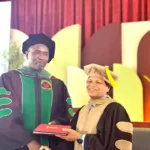Nelson Chamisa’s leadership style questioned as former allies accuse him of dictatorial tendencies
Analysts have raised concerns about the leadership style of former Citizens Coalition for Change (CCC) leader, Nelson Chamisa, as his former allies come forward, accusing him of exhibiting dictatorial tendencies, refusing consultations, and running a one-man show.
Chamisa’s abrupt resignation from the CCC last month, announced through a press statement, caught his supporters, sitting Members of Parliament (MPs), Senators, and councillors off guard. In his statement, Chamisa alleged that ZANU PF had infiltrated the party through proxies such as self-proclaimed interim CCC secretary-general, Sengezo Tshabangu.
Chamisa established the CCC in January 2022 after losing control of the MDC Alliance to Douglas Mwonzora. He assumed the presidency of the MDC under controversial circumstances following the death of the late Morgan Tsvangirai in February 2018.
Shortly after launching the CCC, the youthful leader disbanded its structures, claiming a need to protect the political outfit from infiltration. Chamisa adopted a strategy of “strategic ambiguity” while refusing to establish new structures. He has also remained vague about his next move, despite indications that he is in the process of launching a new party.
Notably, Chamisa’s close allies, former legislators Amos Chibaya and Gift Siziba, have been conducting countrywide tours to popularize blue as the colour of the unnamed movement, hinting at the impending launch of Chamisa’s new party. However, senior opposition figures, including sitting and recalled parliamentarians, have expressed their displeasure at the duo holding provincial meetings without their knowledge. Some legislators have also stated that they cannot resign from the CCC until Chamisa clarifies his plans.
Former Seke legislator, Willard Madzimbamuto, recently criticized the handling of the proposed new movement, portraying Chamisa as a dictator.
In response to these concerns, Chamisa urged people to ignore the noise and wait for the announcement of his next move. However, senior lecturer Ricky Mukonza from South Africa’s Tshwane University of Technology expressed his unease over emerging details regarding Chamisa’s leadership style, highlighting a lack of transparency and accountability. Mukonza emphasized the importance of checks and balances within a democracy and questioned whether Chamisa’s leadership style would enable him to effectively govern in a more complex environment such as running the State.
Professor Stephen Chan, a World Politics expert at the University of London’s School of Oriental and African Studies, commented that as things currently stand, it is unlikely that Chamisa will remove ZANU PF from power.
Political analyst Methuseli Moyo echoed similar sentiments, stating that those hoping for change from Chamisa were being too optimistic. Moyo criticized Chamisa’s team-building skills and highlighted his failure to unseat ZANU PF in two previous elections.
Nonetheless, political analyst Rashweat Mukundu offered a different perspective, suggesting that Chamisa’s leadership style should be understood in the context of repression and infiltration by ZANU PF and the state apparatus. Mukundu pointed out that Chamisa successfully led the MDC to victory following Tsvangirai’s death, but subsequent disruptions caused by the capture and politicization of parliament, the judiciary, and the police hindered progress.
Critics have also accused Chamisa of hiding behind Bible verses when confronted about his leadership style, often using the phrase “GodIsInIt.”
Concerns are mounting over Nelson Chamisa’s leadership style, with accusations of dictatorial tendencies and a lack of consultation. As the political landscape in Zimbabwe continues to evolve, it remains to be seen how these criticisms will impact Chamisa’s future political endeavours.

Follow @MyZimbabweNews












